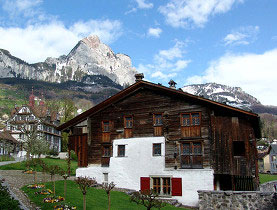Scientists link bad weather to historical lows

A Swiss-led team of scientists has used tree rings to detail 2,500 years of European summers, identifying the link between climate and major historical changes.
The findings give fascinating new context to centuries of European history. Results indicate, for example, that wet and warm summers facilitated Roman and medieval prosperity, and that the demise of the Western Roman Empire coincided with a period of increased climate variability.
The wide tranche of temperature and precipitation data is also useful in assessing the magnitude of today’s problems.
Although the extent of recent global warming is unprecedented, the last two millennia did have wet or dry episodes that were more extreme or lasted longer than the warming event that’s now underway, researchers said.
In the paper entitled “2,500 Years of European Climate Variability and Human Susceptibility”, published in Science, lead author Ulf Büngten provides evidence that agrarian wealth and economic growth might be related to climate change that occurs across years or decades.
Büngten of the Oeschger Centre for Climate Change Research at Bern University headed a multi-disciplinary team including climatologists, historians and archeologists from German, American, Austrian and Swiss institutions.
Weathervane
Over time a stable and favourable climate influences food production and human health, with implications for overall prosperity and political stability.
On the negative side pre-industrial societies were vulnerable to famine, disease and war, which were also partly driven by drought, flood, frost and other weather events.
The broader the canvas, the easier it is to identify norms and variations, and what’s new in this research is that it presents palaeoclimatic, or past climate, evidence for a millennium prior to the medieval period.
“All our results are based on tree ring data,” Büngten told swissinfo.ch.
Some 9,000 samples from Central Europe were collected, compiled and analysed, each one containing 100 to 150 annual rings which give a snapshot of vegetation growth and therefore weather conditions for that year.
“There are no missing years. We provide a value for each year, we have no dating uncertainty and it’s a continuous record with annual resolution all the way back. That’s the beauty of the archive”, Büngten said.
Long term view
Fidel González-Rouco, climate specialist from the University of Madrid, said the new research has made an important contribution to expanding knowledge of temperature and precipitation in Central Europe over two millennia.
“I think that the paper offers a fascinating view of how closely related societal changes in agriculture, migration, political shifts, etc., run parallel to reconstructed climatic variations and might have been connected,” González-Rouco told swissinfo.ch.
He also echoes a point made by the researchers who question the wisdom of “the common societal belief that civilisations are insulated from variations in the natural environment”.
“Their analysis challenges positions that may envision society and climate as two disconnected elements and that may be tempted to dismiss societal sensitivity to climate in the future,” González-Rouco said.
Woodwork
The number of oak samples available also gives a good indication of historic context. There are periods of more or less duplication.
“With construction timber we are able to see patterns of increased or decreased building or settlement activity,” Büngten explained.
“A very good example is a depression during the Thirty Years War at the beginning of the 17th century where settlement activity was limited due to war activities in Central Europe. The same pattern appeared in the mid to late 14th century during the plague of the Black Death.”
The authors of this study are not claiming that climate is the answer to every historical question. However they say they have provided “a palaeoclimatic benchmark” which makes clearer its critical influence on the human condition.
Exceptional climate variability is reconstructed for 250 to 500 AD, coinciding with some of the most severe challenges in Europe’s political social and economic history, known as the Migration Period or the Barbarian Invasions.
The onset of wetter and warmer summers is contemporaneous with the societal consolidation of new kingdoms that developed in the former Western Roman Empire.
Reduced climate variability from 700 to 1000 AD matches the new and sustained demographic growth in the northwest European countryside.
Humid and mild summers paralleled the rapid cultural and political growth of medieval Europe under the Merovingian and Carolingian dynasties.
Wetter summers during the 13th and 14th centuries and a first cold spell around 1300 agree with the globally observed onset of the Little Ice Age, likely contributing to widespread famine in Central Europe.
Unfavourable climate may even have played a role in debilitating the underlying health conditions leading up to the devastating Black Death plague which reduced the region’s population by 40 to 60%.
Sustained low temperatures in the early 17th century accompanied sustained settlement abandonment during the Thirty Years War.
Precipitation-sensitive oak ring widths from sub-fossil, archaeological, historical timber and living wood. Representing temperate forests in northeastern France, northeastern Germany and southeastern Germany.
A total of 87 different medieval written sources consulted.
The tree rings provide one record related to temperature for June, July and August. The second reconstruction is precipitation in spring and early summer, i.e. April, May and June.

In compliance with the JTI standards
More: SWI swissinfo.ch certified by the Journalism Trust Initiative

You can find an overview of ongoing debates with our journalists here. Please join us!
If you want to start a conversation about a topic raised in this article or want to report factual errors, email us at english@swissinfo.ch.